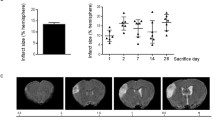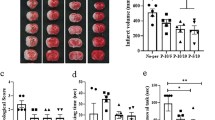Abstract
Ischemic postconditioning (IPostC) has been reported to have neuroprotection against ischemic diseases, and one cycle of IPostC induces neurogenesis when treated nearby. To expanding these effects, we explored the effects of repetitively remote IPostC (NRIPostC) on neurogenesis in the subgranular zone (SGZ) and subentricular zone (SVZ) during stroke recovery. Animals underwent transient cerebral ischemia were treated with vehicle or NRIPostC immediately after reperfusion. Neurological severity scores, infarct size, neurogenesis, and protein expression levels of nestin and GFAP were quantified at 3d, 7d, 14d, 21d and 28d post-ischemia. Results showed that NRIPostC significantly reduced acute infarction and improved neurological outcomes during the recovery phase. Meanwhile, NRIPostC significantly increased the number of BrdU+/nestin+ cells in SGZ on day 14 and in the SVZ on days 3, 7 and 14 respectively, and the number of DCX+ cells from days 3 to 14. There were significant increments in the number of BrdU+/NeuN+ and BrdU+/GFAP+ cells in the SGZ and SVZ during the stroke recovery. The changing tendency of the protein expression of nestin and GFAP in DG was consistent with the result mentioned above. In conclusion, NRIPostC reduced acute infarction and improved functional outcomes up to 28d, and it induced neurogenesis both in the SGZ and SVZ.










Similar content being viewed by others
Abbreviations
- BrdU:
-
bromodeoxyuridine
- BSA:
-
bovine serum albumin
- DAPI:
-
4, 6-diamidino-2-phenylindole
- DCX:
-
doublecortex
- DG:
-
dentate gyrus
- MCAO:
-
middle cerebral ischemia
- GFAP:
-
glial fibrillary acidic protein
- IPostC:
-
ischemic postconditioning
- I/R:
-
ischemia/reperfusion
- mNSS:
-
Modified Neurological Severity Score
- NeuN:
-
neuronal nuclear protein
- NLIP:
-
non-invasive limb ischemic postconditioning
- rCBF:
-
regional cerebral blood flow
- RIP:
-
remote ischemic postconditioning
- NRIPostC:
-
non-invasively remote ischemic postconditioning
- SGZ:
-
subgranular zone
- SVZ:
-
subventricular zone
References
Barkho BZ, Zhao X (2011) Adult neural stem cells: response to stroke injury and potential for therapeutic applications. Curr Stem Cell Res Ther 6:327–338
Brown JP, Couillard-Despres S, Cooper-Kuhn CM, Winkler J, Aigner L, Kuhn HG (2003) Transient expression of doublecortin during adult neurogenesis. J Comp Neurol 467:1–10
Esposito E, Hayakawa K, Maki T, Arai K, Lo EH (2015) Effects of Postconditioning on neurogenesis and angiogenesis during the recovery phase after focal cerebral ischemia. Stroke 46:2691–2694
Font MA, Arboix A, Krupinski J (2010) Angiogenesis, neurogenesis and neuroplasticity in ischemic stroke. Curr Cardiol Rev 6:238–244
Garcia JH, Wagner S, Liu KF, Hu XJ (1995) Neurological deficit and extent of neuronal necrosis attributable to middle cerebral artery occlusion in rats. Statistical validation Stroke 26:627–634 discussion 635
Gregoire CA, Goldenstein BL, Floriddia EM, Barnabe-Heider F, Fernandes KJ (2015) Endogenous neural stem cell responses to stroke and spinal cord injury. Glia 63:1469–1482
Guo ZH, Li F, Wang WZ (2009) The mechanisms of brain ischemic insult and potential protective interventions. Neurosci Bull 25:139–152
Guo JY, Yang T, Sun XG, Zhou NY, Li FS, Long D, Lin T, Li PY, Feng L (2011) Ischemic postconditioning attenuates liver warm ischemia-reperfusion injury through Akt-eNOS-NO-HIF pathway. J Biomed Sci 18:79
Itoh T, Satou T, Nishida S, Hashimoto S, Ito H (2007) Immature and mature neurons coexist among glial scars after rat traumatic brain injury. Neurol Res 29:734–742
Itoh T, Satou T, Takemori K, Hashimoto S, Ito H (2010) Neural stem cells and new neurons in the cerebral cortex of stroke-prone spontaneously hypertensive rats after stroke. J Mol Neurosci 41:55–65
Jauch EC, Saver JL, Adams HP Jr, Bruno A, Connors JJ, Demaerschalk BM, Khatri P, McMullan PW Jr, Qureshi AI, Rosenfield K, Scott PA, Summers DR, Wang DZ, Wintermark M, Yonas H (2013) Guidelines for the early management of patients with acute ischemic stroke: a guideline for healthcare professionals from the American Heart Association/American Stroke Association. Stroke 44:870–947
Kerendi F, Kin H, Halkos ME, Jiang R, Zatta AJ, Zhao ZQ, Guyton RA, Vinten-Johansen J (2005) Remote postconditioning. Brief renal ischemia and reperfusion applied before coronary artery reperfusion reduces myocardial infarct size via endogenous activation of adenosine receptors. Basic Res Cardiol 100:404–412
Li P, Su L, Li X, Di W, Zhang X, Zhang C, He T, Zhu X, Zhang Y, Li Y (2015) Remote limb ischemic postconditioning protects mouse brain against cerebral ischemia/reperfusion injury via upregulating expression of Nrf2, HO-1, NQO-1 in mice. Int J Neurosci:1–28
Liang J, Luan Y, Lu B, Zhang H, Luo YN, Ge P (2014) Protection of ischemic postconditioning against neuronal apoptosis induced by transient focal ischemia is associated with attenuation of NF-kappaB/p65 activation. PLoS One 9:e96734
Longa EZ, Weinstein PR, Carlson S, Cummins R (1989) Reversible middle cerebral artery occlusion without craniectomy in rats. Stroke 20:84–91
Peng B, Guo QL, He ZJ, Ye Z, Yuan YJ, Wang N, Zhou J (2012) Remote ischemic postconditioning protects the brain from global cerebral ischemia/reperfusion injury by up-regulating endothelial nitric oxide synthase through the PI3K/Akt pathway. Brain Res 1445:92–102
Peng ZR, Yang AL, Yang QD (2014) The effect of hyperbaric oxygen on intracephalic angiogenesis in rats with intracerebral hemorrhage. J Neurol Sci 342:114–123
Ren C, Yan Z, Wei D, Gao X, Chen X, Zhao H (2009) Limb remote ischemic postconditioning protects against focal ischemia in rats. Brain Res 1288:88–94
Ren C, Li S, Wang B, Han R, Li N, Gao J, Li X, Jin K, Ji X (2016) Limb remote ischemic conditioning increases notch signaling activity and promotes arteriogenesis in the ischemic rat brain. Behav Brain Res
Ruan L, Wang B, ZhuGe Q, Jin K (2015) Coupling of neurogenesis and angiogenesis after ischemic stroke. Brain Res 1623:166–173
Taninishi H, Jung JY, Izutsu M, Wang Z, Sheng H, Warner DS (2015) A blinded randomized assessment of laser Doppler flowmetry efficacy in standardizing outcome from intraluminal filament MCAO in the rat. J Neurosci Methods 241:111–120
Taupin P (2007) BrdU immunohistochemistry for studying adult neurogenesis: paradigms, pitfalls, limitations, and validation. Brain Res Rev 53:198–214
Wang B, Jin K (2015) Current perspectives on the link between neuroinflammation and neurogenesis. Metab Brain Dis 30:355–365
Wang C, Zhang M, Sun C, Cai Y, You Y, Huang L, Liu F (2011a) Sustained increase in adult neurogenesis in the rat hippocampal dentate gyrus after transient brain ischemia. Neurosci Lett 488:70–75
Wang Q, Zhang X, Ding Q, Hu B, Xie Y, Li X, Yang Q, Xiong L (2011b) Limb remote postconditioning alleviates cerebral reperfusion injury through reactive oxygen species-mediated inhibition of delta protein kinase C in rats. Anesth Analg 113:1180–1187
Wardlaw JM, Murray V, Berge E, del Zoppo GJ (2014) Thrombolysis for acute ischaemic stroke. Cochrane database Syst rev 7:Cd000213
Wei L, Yu SP, Gottron F, Snider BJ, Zipfel GJ, Choi DW (2003) Potassium channel blockers attenuate hypoxia- and ischemia-induced neuronal death in vitro and in vivo. Stroke 34:1281–1286
Winstein CJ, Stein J, Arena R, Bates B, Cherney LR, Cramer SC, Deruyter F, Eng JJ, Fisher B, Harvey RL, Lang CE, MacKay-Lyons M, Ottenbacher KJ, Pugh S, Reeves MJ, Richards LG, Stiers W, Zorowitz RD (2016) Guidelines for adult stroke rehabilitation and recovery: a guideline for healthcare professionals from the American Heart Association/American Stroke Association. Stroke 47:e98–e169
Yagita Y, Kitagawa K, Ohtsuki T, Takasawa K, Miyata T, Okano H, Hori M, Matsumoto M (2001) Neurogenesis by progenitor cells in the ischemic adult rat hippocampus. Stroke 32:1890–1896
Zhang RL, Zhang ZG, Zhang L, Chopp M (2001) Proliferation and differentiation of progenitor cells in the cortex and the subventricular zone in the adult rat after focal cerebral ischemia. Neuroscience 105:33–41
Zhang W, Wang B, Zhou S, Qiu Y (2012) The effect of ischemic post-conditioning on hippocampal cell apoptosis following global brain ischemia in rats. J Clin Neurosci 19:570–573
Zhang RL, Chopp M, Roberts C, Liu X, Wei M, Nejad-Davarani SP, Wang X, Zhang ZG (2014) Stroke increases neural stem cells and angiogenesis in the neurogenic niche of the adult mouse. PLoS One 9:e113972
Zhao H, Wang R, Tao Z, Gao L, Yan F, Gao Z, Liu X, Ji X, Luo Y (2014) Ischemic postconditioning relieves cerebral ischemia and reperfusion injury through activating T-LAK cell-originated protein kinase/protein kinase B pathway in rats. Stroke 45:2417–2424
Zong Y, Jiang L, Zhang M, Zhou F, Qi W, Li S, Yang H, Zou Y, Xia Q, Zhou X, Hu X, Wang T (2015) Limb remote ischemic postconditioning protects cerebral ischemia from injury associated with expression of HIF-1alpha in rats. BMC Neurosci 16:97
Acknowledgments
This work was supported by the National Youth Science Foundation (grant number 81401858).
Author information
Authors and Affiliations
Corresponding authors
Rights and permissions
About this article
Cite this article
Huang, D., Liu, H., Qu, Y. et al. Non-invasive remote ischemic postconditioning stimulates neurogenesis during the recovery phase after cerebral ischemia. Metab Brain Dis 32, 1805–1818 (2017). https://doi.org/10.1007/s11011-017-0068-3
Received:
Accepted:
Published:
Issue Date:
DOI: https://doi.org/10.1007/s11011-017-0068-3




